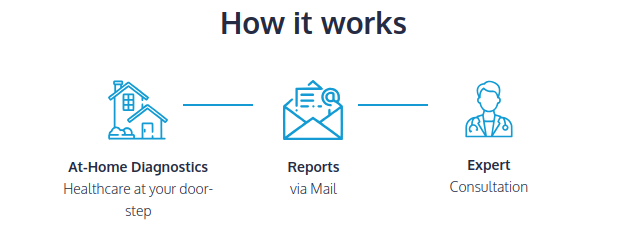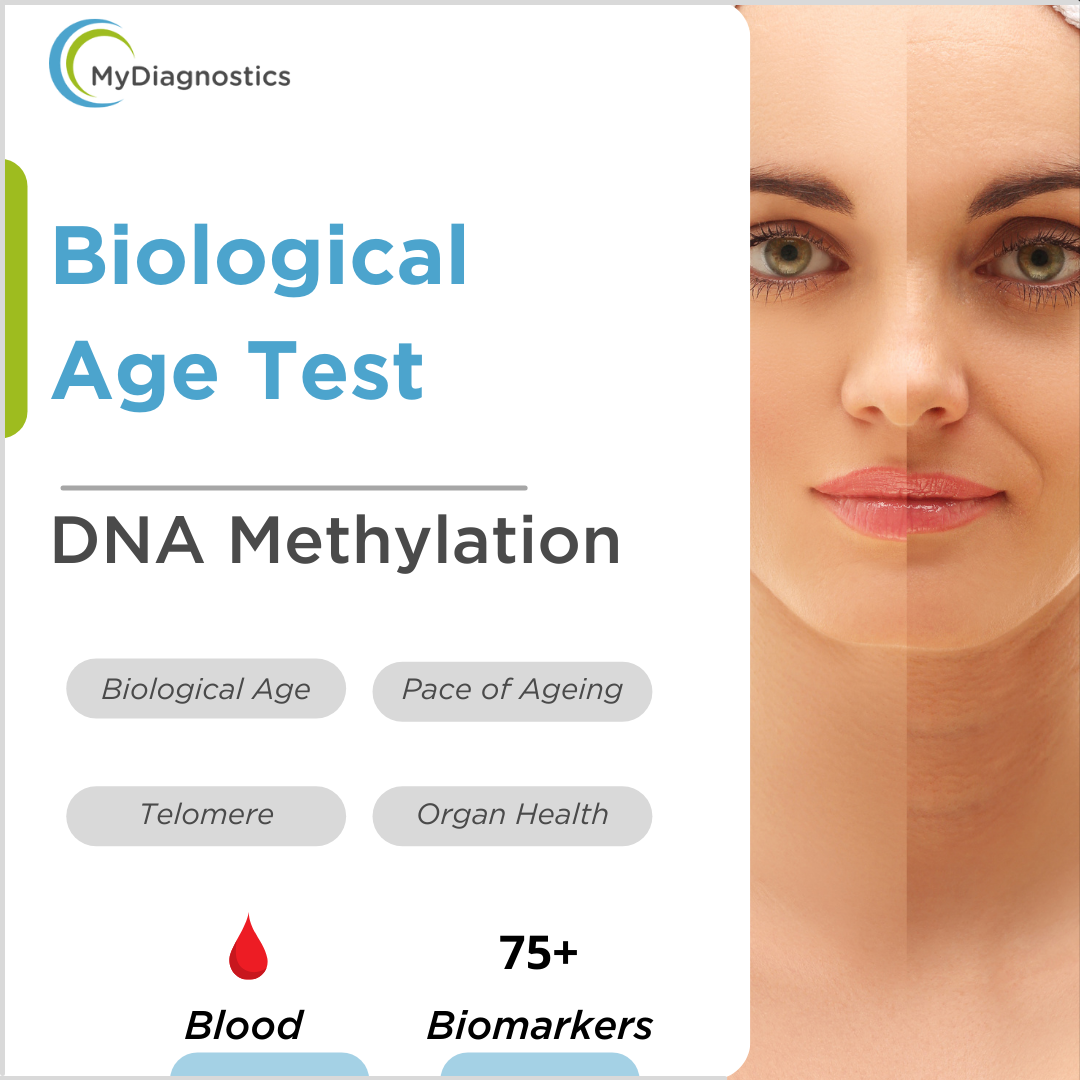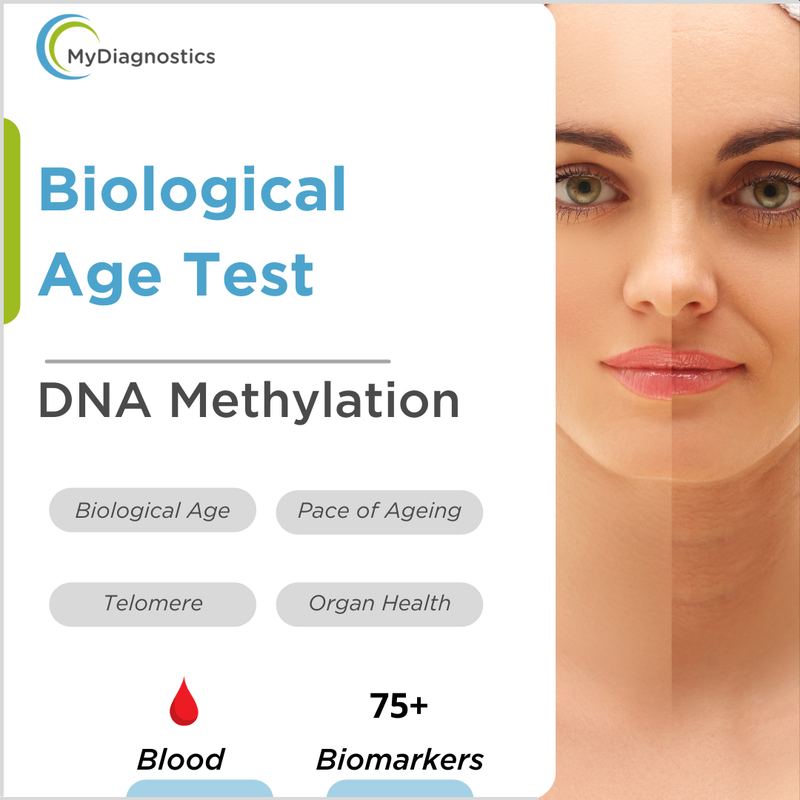Biological Age Test - Gold Standard - DNA Methylation
Test Parameters

Unlock the Secrets of Your Biological Age for a Healthier, Longer Life
Discover a revolutionary approach to understanding your aging process at the molecular level. The Epigenetic DNA Methylation Test analyzes your DNA’s methylation patterns to determine your biological age—a precise indicator of your cellular health and longevity. Gain actionable insights to optimize your wellness journey and enhance your quality of life.
What is Epigenetics and DNA Methylation ?
Epigenetics is the study of how your lifestyle, environment, and behaviors influence gene expression without altering the underlying DNA sequence. One of the most critical mechanisms in epigenetics is DNA methylation—the addition of methyl groups to your DNA, which can turn genes "on" or "off."
- DNA Methylation Patterns: These patterns change as you age and can reflect your biological age, revealing how well your body is maintaining cellular health.
- Biological vs. Chronological Age: While your chronological age is based on your birthdate, your biological age considers the state of your cells and tissues, providing a more accurate picture of your true aging process.
Why Test Your Biological Age ?
Understanding your biological age offers numerous benefits:
- Personalized Health Insights: Identify whether your body is aging faster or slower than expected, enabling early intervention for potential health risks.
- Track Lifestyle Improvements: Monitor the impact of changes in diet, exercise, sleep, and stress management on your cellular aging.
- Motivation for Healthy Choices: Use your biological age as a tangible metric to inspire and maintain healthy habits.
- Optimize Longevity: Implement strategies to slow down the aging process and enhance your overall well-being.
What You'll Receive in Your Report?
1. Biological Age
Biological Age reflects the true condition of your body’s cells and tissues, offering a more accurate measure of your health compared to your chronological age. By analyzing DNA methylation patterns, the TruAge test determines how effectively your body is aging, helping you identify areas that may require attention to optimize your longevity and vitality.
2. Pace of Ageing (DunedinPACE)
The Pace of Ageing (DunedinPACE) score evaluates the speed at which your body is aging. Developed from the Dunedin Study, this metric provides insights into how lifestyle choices and genetic factors influence your aging process. Understanding your Pace of Ageing helps you make informed decisions to slow down cellular deterioration and enhance your overall healthspan.
3. Telomere Length
Telomere Length is a key indicator of cellular aging. Telomeres, the protective caps at the ends of chromosomes, shorten as cells divide and age. By measuring telomere length, the test assesses your cellular resilience and potential for longevity. Longer telomeres are associated with reduced risks of age-related diseases and improved lifespan.
4. Mitotic Clock
The Mitotic Clock tracks the number of times your cells have divided, providing a precise measure of cellular turnover and aging. This metric helps identify how your body’s cells are regenerating and repairing, offering valuable insights into your overall cellular health and the effectiveness of your anti-aging strategies.
5. Organ Systems Age
Organ Systems Age evaluates the health and functionality of your major organ systems, including the heart, liver, kidneys, and more. By assessing the biological age of each organ, the report highlights specific areas that may need targeted interventions to maintain optimal performance and prevent age-related decline.
6. Immune Cell Functioning
Immune Cell Functioning measures the efficiency of your immune system at the cellular level. A robust immune system is crucial for defending against infections, reducing inflammation, and promoting overall health. This metric helps you understand how well your immune cells are performing and identifies potential areas for boosting your immune resilience.
7. Smoking Risk
Smoking Risk assesses the impact of smoking on your biological age and overall health. By analyzing DNA methylation patterns associated with tobacco exposure, the Biological Age test quantifies the accelerated aging effects of smoking. This information empowers you to make informed choices about smoking cessation and mitigate its long-term health consequences.
8. Alcohol Consumption Risk
Alcohol Consumption Risk evaluates how alcohol intake affects your biological aging process. Excessive alcohol consumption can lead to accelerated aging and increased risks of various health conditions. The Biological Age report provides insights into how your drinking habits influence your cellular health, guiding you toward healthier lifestyle adjustments.
9. Weight Loss Response
Weight Loss Response measures how your body responds to weight loss efforts at the cellular level. This metric helps you understand the effectiveness of your weight management strategies and their impact on your biological age. By optimizing your weight loss approach, you can enhance your overall health and slow down the aging process.
What is the accuracy of the Biological Age Test ?
Unmatched Precision & Gold Standard with DNA Methylation (Epigenetic Clock Method)
DNA methylation is the gold standard for measuring biological age due to its exceptional accuracy and reliability. By analyzing specific methylation markers on your DNA, this test provides a precise measure of your cellular aging process. This method captures a comprehensive snapshot of your genetic health, making it more accurate than other biological age assessments.
State-of-the-art laboratories ensure that every test is conducted with the highest standards of accuracy and reliability:
- Advanced Sequencing Technologies: Utilize cutting-edge platforms for detailed DNA methylation analysis.
- CLIA-Certified Labs: Adhere to stringent quality control protocols, ensuring trustworthy results.
How does Biological Age differ from Chronological Age ?
Chronological age is the number of years you have lived, while biological age reflects the condition of your cells and tissues, offering a more accurate measure of your true aging process.
Can the Biological Test detect specific diseases ?
While the Biological Age test provides insights into your biological age and cellular health, it is not designed to diagnose specific diseases. It can, however, indicate areas where your cellular aging may increase the risk of certain conditions
How it works ?
-
Order Your Test
Place your order online, and schedule Home Visit. -
Collect Samples
Our technicians will collect Blood sample at home. No fasting is required. -
Receive Your Results
Receive a detailed, personalized report that compares your biological age to your chronological age. The report includes actionable insights and recommendations tailored to your unique genetic profile
Who should consider the Biological Age Test ?
-
Those Experiencing Health Changes
- People noticing shifts in energy, metabolism, or overall vitality who seek deeper insights into their health.
-
Longevity Researchers & Practitioners
- Professionals engaged in anti-aging therapies or holistic health programs looking for measurable outcomes.
-
Individuals with Family History of Age-Related Diseases
- Those who want to take proactive steps in managing their health and reducing the risk of inherited conditions.
-
Biohackers
- Tech-savvy individuals interested in using advanced scientific tools to enhance their health and longevity.
Why Does our Body Age ?
Aging is a natural process influenced by genetics, lifestyle, and environmental factors. At the core of aging are seven key biological mechanisms known as the 7 Hallmarks of Aging. Understanding these can help you take proactive steps to maintain your health and vitality longer.
1. Genomic Instability
Over time, your DNA accumulates damage from things like UV rays, pollution, and everyday metabolic processes. This damage can disrupt how your cells function and increase the risk of diseases like cancer.
2. Telomere Shortening
Telomeres are protective caps at the ends of your chromosomes. Each time a cell divides, telomeres get shorter. When they become too short, cells can no longer divide properly, leading to aging and age-related diseases.
3. Epigenetic Changes
Epigenetics involves changes in gene activity without altering the DNA sequence. As you age, these changes can turn important genes on or off, affecting how your body functions and accelerates the aging process.
4. Loss of Proteostasis
Proteostasis is the balance of protein creation, folding, and disposal in your cells. Aging disrupts this balance, leading to the buildup of damaged proteins that impair cell function and contribute to diseases like Alzheimer’s.
5. Deregulated Nutrient Sensing
Your body has pathways that sense nutrients and regulate growth and metabolism. As you age, these pathways become less effective, leading to metabolic imbalances and increased vulnerability to stress.
6. Mitochondrial Dysfunction
Mitochondria are the energy powerhouses of your cells. With age, mitochondria become less efficient and produce more harmful byproducts, reducing energy levels and increasing cell damage.
7. Cellular Senescence
Senescent cells stop dividing and release harmful substances that cause inflammation and tissue damage. Accumulation of these cells contributes to aging and the decline of bodily functions.
About the Quality
Quality assurance is done at 3 levels
- Sample collection from home using one time sealed QR coded sterile kits and transportation to the lab including the temperature condition requirements
- Sample acceptance and QC at the lab
- Sample run at the NABL/CAP/ISO/CLIA certified labs
What does Biological Age tell me about my Mental Halth ?
Understanding your biological age goes beyond just assessing your physical health—it also offers valuable insights into your mental well-being and cognitive function. Here's how your biological age can inform you about your mental health and what it means for your overall quality of life:
1. Cognitive Function and Brain Health
Biological age reflects the state of your brain cells and neural pathways. A younger biological age is often associated with better cognitive function, including memory, attention, and problem-solving skills. Conversely, an older biological age may indicate:
- Cognitive Decline: Early signs of memory loss or reduced cognitive abilities.
- Increased Risk of Neurodegenerative Diseases: Higher biological age can correlate with a greater likelihood of conditions like Alzheimer's or Parkinson's disease.
2. Stress and Mental Resilience
Chronic stress accelerates the aging process at the cellular level, impacting your biological age. By assessing your biological age, you can gain insights into:
- Stress Levels: Elevated biological age may indicate prolonged exposure to stress, affecting mental resilience.
- Emotional Well-being: Understanding how stress affects your cellular health can help you implement strategies to improve emotional balance and reduce anxiety or depression.
3. Sleep Quality and Mental Health
Quality sleep is crucial for maintaining both physical and mental health. Your biological age can reveal:
- Sleep Efficiency: Poor sleep patterns contribute to an older biological age, affecting mood regulation and cognitive performance.
- Mental Clarity: Adequate sleep supports better mental clarity and reduces the risk of mood disorders.
4. Inflammation and Mental Health
Chronic inflammation is linked to both aging and mental health issues. An older biological age may indicate:
- Increased Inflammatory Markers: Higher levels of inflammation can contribute to conditions like depression and anxiety.
- Mental Fatigue: Persistent inflammation can lead to mental exhaustion and reduced cognitive performance.
- For those who want to identify risk factors of chronic conditions before it develops as a disease.
- To evaluate key body parameters and avoid the risk to major organs of your body.
- No fasting is required.
- Please do not consume alcohol 24-48 hours before the test.
- Avoid eating, drinking (other than water), or brushing your teeth for atleast 30 minutes before each collection.





